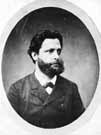
|
|
|

|

|

|

|
|
Click on an image to see a larger, more detailed picture.
|
|
|
|
|
| PROLOGUE: Roots of the Holocaust |

|
pg. 33 |

|
|
|
|
| |
 Influences on Hitler
Influences on Hitler
The foundations of Hitler's worldview took shape during the six poverty-stricken years he spent in the Austrian capital of Vienna, from 1907 to 1913. His attitudes developed from the frustrations he experienced there, and were based on the interrelated concepts of social Darwinism, antisocialism, and antisemitism. Reduced to living among Vienna's dregs of society and robbed of his self-esteem, the young Hitler deeply resented being denied access to the splendor and gaiety of the city. There, in what he termed a world of "repugnant filth," he saw himself engaged in a struggle for survival, in which only the fittest, most brutal, stood a chance. Applying this lesson to his Machiavellian perception of life, he declared in Mein Kampf that "he who wants to live should fight, and he who does not want to battle in this world of eternal struggle does not deserve to be alive." Hitler contemptuously perceived working-class ideologies to be intrinsically weak doctrines that "reject the aristocratic principle of nature, and replace the eternal privilege of power and strength by the mass of numbers." This, he was sure, would result in the "collapse of human civilization." It was no mere coincidence, he reasoned, that Jews were behind these "doctrines of destruction." Hitler's nationalist and antisemitic ideology began to crystallize as a result of his exposure to an abundance of poisonous literature. Antisemitism became the driving force in his life. Among his favorite reading was the gutter journal Ostara, edited by Lanz von Liebenfels, an eccentric ex-monk. This crackpot racial theorist imagined blue-eyed, blond Aryans waging a monumental struggle against the "race defilement" danger posed by what he termed "monkey people." Hitler acquired his first political education by studying the propaganda techniques and demagoguery of Dr. Karl Lueger (pictured), the antisemitic mayor of Vienna. Lueger was a skillful manipulator of mass audiences who pushed for the removal of Jews from influential positions. From Adolf Stoecker, the leading German antisemite of the late 19th century, Hitler borrowed the notion that Jews who controlled corporations and banks were the inevitable cause of the economic misfortunes of small-business owners. Hitler also studied the völkisch (racist-nationalist) extremist philosophy of politician Georg von Schönerer, who demanded that all culturally German lands within the Hapsburg Empire be incorporated into the Reich. Perhaps the most influential writers shaping Hitler's formulation of race theory were philosopher Eugen Dühring and journalist Wilhelm Marr. Basing their shrill message on pseudoscientific arguments, they expounded a biologically based antisemitism. Warning that the German race was in grave danger, they urged the adoption of special laws against Jews, and--hauntingly--called for their deportation.
Photo: Ullstein Bilderdienst
|
|

|

|

|

|
 October 23, 1907: A Berlin libel case, Moltke v. Harden, leads to the exposure of considerable homosexuality and sodomy in the German military and the Kaiser's inner circle. The case will later help to justify Nazi abuse of homosexuals.
October 23, 1907: A Berlin libel case, Moltke v. Harden, leads to the exposure of considerable homosexuality and sodomy in the German military and the Kaiser's inner circle. The case will later help to justify Nazi abuse of homosexuals.
|
 1907-1941: Approximately 38,000 mentally disabled men and women are sterilized in American mental institutions.
1907-1941: Approximately 38,000 mentally disabled men and women are sterilized in American mental institutions.
|
 1910: British Home Secretary Winston Churchill, inspired by eugenics theories of Sir Francis Galton, urges that some 100,000 "degenerate British citizens" be sterilized or interned in labor camps.
1910: British Home Secretary Winston Churchill, inspired by eugenics theories of Sir Francis Galton, urges that some 100,000 "degenerate British citizens" be sterilized or interned in labor camps.
|
 1911-1913: In Russia, Menahem Mendel Beilis, a Jew, is put on trial for the ritual murder of a Christian boy. After two years followed by a "show trial," Beilis is acquitted.
1911-1913: In Russia, Menahem Mendel Beilis, a Jew, is put on trial for the ritual murder of a Christian boy. After two years followed by a "show trial," Beilis is acquitted.
|
 1913-1915: The Leo Frank Affair occurs in Atlanta, Georgia. Frank, a northern Jew, is falsely accused of murdering a 13-year-old Christian girl. Amid an intensely antisemitic environment, which makes a fair trial impossible, Frank is convicted. Even though the governor commutes his death sentence, a mob breaks into prison and lynches Frank.
1913-1915: The Leo Frank Affair occurs in Atlanta, Georgia. Frank, a northern Jew, is falsely accused of murdering a 13-year-old Christian girl. Amid an intensely antisemitic environment, which makes a fair trial impossible, Frank is convicted. Even though the governor commutes his death sentence, a mob breaks into prison and lynches Frank.
|
|
|
|
|
| PROLOGUE: Roots of the Holocaust |

|
pg. 33 |

|
|
The Holocaust Chronicle
© 2009 Publications International, Ltd.
|
|
